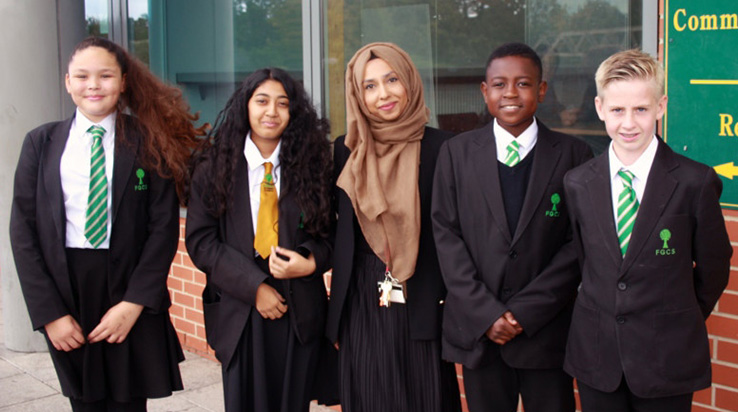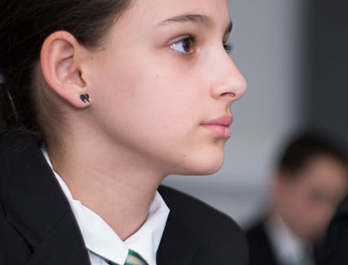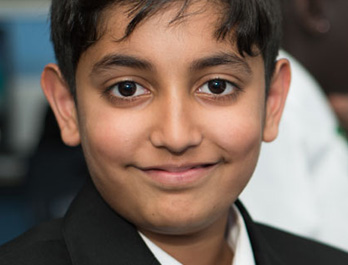
The Background
Forest Gate Community School (FGCS) is an exceptional Secondary School in Newham in East London. Serving a very diverse community, Ofsted judged the school “Outstanding” in its last review, and the Daily Mail described it as "one of the most inspirational schools in Britain". With 1,300 pupils on the school roll and growing fast, FGCS prides itself in challenging students to go further, with excellent support from a staff team who share the same commitment to deliver interesting and engaging lessons that raise attainment ever higher.
The school has an excellent teaching team, with a modern, well-equipped estate to support learning. It is therefore no surprise that they made the decision many years ago to engage a leading technology partner in RM – tasking them with ensuring that their technical infrastructure matched their ambitions right across the school.
The Challenge
FGCS anticipated the Coronavirus lockdown before the Prime Minister announced it on 20th March 2020. They sought to prepare for the inevitable by adapting their teaching programme, with all staff briefed and trained on how to teach remotely, several weeks before it became mandatory.
That said, it was still a significant upheaval for the school –staff and pupils – when lockdown came.
The Response
The school were already using Google Drive and G Drive – the suite of cloud-based computing, productivity and collaboration tools, software and products developed by Google. They had started to use Google Meet for internal meetings, although this was not yet fully embedded. They had also begun putting in place various protocols to support remote learning, should the inevitable happen.
“Looking back on it, the transition was probably smoother for us than other schools. If anything, it was probably the extension of Google Meet to deliver live lessons that was the biggest challenge… but in the scheme of things, that was pretty minor – which without being arrogant, is – I think – down to how relatively well prepared we were”.
Thahmina Begum, Head of School
The school also already had Dynamic Progress Reporting (DPR) in place to track student progress. This is Google-enabled and was used to upload homework and lessons as well as track the progress and engagement of students’ learning. As such, it was relatively seamless to continue using that – along with Google Meet for the live lessons – as the main backbone for Remote Learning for pupils.
Whilst security was paramount on their list of concerns, the school were reassured that DPR ensured that only members of the right classes could access the content, with a different link created each time to avoid chat rooms being created inadvertently.
“As a school we recognised many years ago that our teachers needed to be technically proficient. As such we have run regular and frequent training sessions on the use of the Google suite of software for some time”.
Thahmina Begum, Head of School
This training culture was reinforced during lockdown with a series of short 30-second “how to” videos prepared by the Head of School, on a whole range of topics that were relevant to the ongoing situation.
“Lesson planning is a brand new skill online. No-one had training on that before. We all had to very quickly learn how to do it, and how to do it very well”.
Thahmina Begum, Head of School

Not surprisingly, the school did encounter a number of technical issues – especially at the start – and it was here that their IT partner came into their own.
“At a time when anxieties were running high, and everyone was worried about the unknown, it was important that we had someone to take some of the pressure off. RM played that role for us – we didn’t know whether any specific issue was big or small, but having someone on hand to just deal with them as they arose, was a real help”.
Thahmina Begum, Head of School
Perhaps the biggest challenge of all was ensuring that every pupil had access to a suitable and reliable hardware device to be able to get online – not least in households of several children and/or where parents were also working from home. Through a combination of money from the Government, support from the school, and the generosity of some parents, most children were supported, but this remains an ongoing concern.
“Remote learning cannot happen unless more funds are made available for the hardware itself”.
Thahmina Begum, Head of School

The Lessons Learnt
- Everything is possible. Many people have historically been pessimistic about what schools could achieve, but when adversity hit, every single school in this country rose to the challenge, and many – like Forest Gate Community School – have excelled.
- Child contact is more important than ever. With so much happening in the world, our children needed more reassurance than ever. Delivering live lessons was essential to maintain some form of human and emotional bond at this time – with FGCS feeling they were a hundred times more powerful than simply sending a pack of work home.
- Over communication is better than the opposite. This was a new experience for everyone, so no-one knew what was right. However, it was very clear that all parties – parents, staff, pupils – needed to know what was happening, and that someone was there for them.
- Ongoing training is necessary to de-risk the future. Whilst the school day is always challenging, setting aside regular training minimises the risk that when something unexpected happens, you can react. For FGCS, their prior investment in training their staff on the Google suite of software set them up for the pandemic and all that followed.
- Accept that you can’t do it all. No-one can be expected to know everything. FGCS made the decision several years ago that they would utilise the skills and expertise of a third-party technology partner, rather than build them themselves. When the pandemic hit, they had someone on hand, who had an army of resource behind them, and who were experiencing very similar issues in schools across the country, so could respond effortlessly.
The Legacy
Whichever we look at it, the way that schools will look in the future will be different.
“This is the future – Remote Learning, at least in some form, is here to stay”.
Thahmina Begum, Head of School
In so many ways, the opportunities that this technology enables, can make a step-change in how children are taught. It can make a teacher’s role so much more efficient and rewarding – lessons can be prepared in advance, children can collaborate in ways no-one previously could have imagined, content can be interactive and exciting, and education can happen in a more measured way.
FGCS have operated a system for some time whereby Year 11 students can come into school at weekends to study, which has proved very popular. The challenge at the moment is that it is difficult to offer this in classrooms when safe distancing is necessary. But with Remote Learning this can all be done at home – much more efficiently for all concerned.
Furthermore, with so many teachers and pupils self-isolating – whether they have the virus or are waiting for tests – with Remote Learning they can continue their education as though nothing has happened. The quality of lessons is maintained no matter what challenge is being faced.
“I have often felt that the future could be a four-day in-school week, and with Remote Learning that could be a reality – four days of face-to-face lessons, with the remainder done remotely at the convenience of both student and teacher. This can only work – of course – if pupils also have access to the devices they need”.
Thahmina Begum, Head of School
Download a PDF of the case study